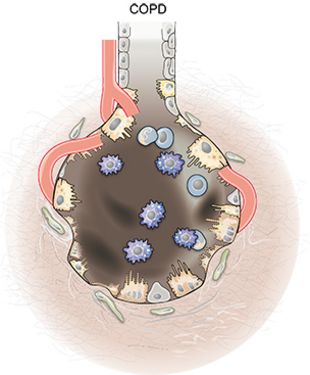Knowledge bites about the connection of nutrition and COPD:
Interview with Prof. Önder Yildirim, Director of the Institute of Lung Health and Immunity and (CPC-M)
Why are you interested in the connection between nutrition and lung diseases?
ÖY: We already know that COPD (chronic obstructive pulmonary disease) is caused by harmful environmental exposures – from smoking to air pollutants to an unhealthy diet. But we do not know yet why some people develop this still incurable disease, and some don't.
Our latest finding now sheds light into this unexplained context: We discovered that the type of diet has a major impact on COPD. We have found that in particular a typical high fat high sugar “western type” diet with too much processed and non-healthy food, coupled with too little exercise triggers COPD. As we know, this leads to obesity, which, in the next steps leads to a metabolic and epigenetic reprogramming of immune and progenitor cells, driving COPD vulnerability. To sum it up: The way we eat plays a crucial role in the development of many chronic diseases – like COPD. That is why my team at Helmholtz Munich and colleagues worldwide are now focusing on the link between nutrition and COPD.
What is your goal when focusing on metabolic driven COPD?
ÖY: In an international collaborative effort, we want to decipher how to prevent people from developing COPD that is caused by metabolic disorders. Then, we want to find therapies that modify the course of the disease. For both reasons, we want to understand the pathogenic interplay between local “lung” and systemic aspects of COPD. Is it possible, that a greater vulnerability for COPD comes from metabolic driven epigenetic reprogramming of immune, lung and muscle progenitor cells? And what role exactly are injuries caused by environmental and lifestyle-related insults playing in this reprogramming? We really want to identify focal vulnerabilities for preventive and therapeutic interventions– be it for younger or elder people, for all sexes or be it for people all over the world, north-south and east-west.
Why is it important to research COPD in an international team?
ÖY: COPD is a worldwide health problem. That is why it is finally important to have to propose recommendations to COPD health policies worldwide and find novel approaches to mitigating the risk of COPD progression and beyond. That is why we developed strong synergies with lung scientists not only at Helmholtz Munich but beyond: With COPD-iNET, we created a network of international COPD researchers who meet regularly to discuss their findings. Also, within the German Center of Lung Research (DZL) we have developed strong cooperations over many years. Lust but not least, Helmholtz Munich provides us with fruitful synergies with multiple researchers from other disciplines who study the metabolic connections in the development of diseases – in diabetes or even further with computational scientists for example. With all these collaborations we hope to intensify and accelerate the way we understand, prevent, and treat COPD soon.
Networks and Related Information:


